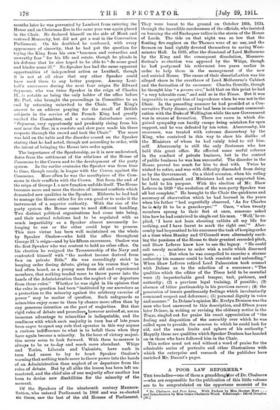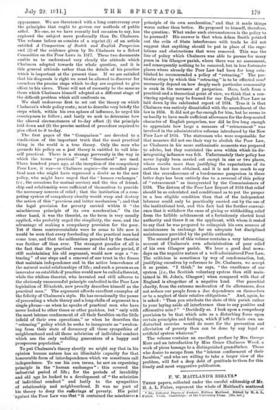A POOR LAW REFORMER.*
THE two ladies—one of them a granddaughter of Dr. Chalmers —who are responsible for the publication of this little volume are to be congratulated on the opportune Mordent of its • Dr. Chalmers and Poor Laws. With Preface by Mrs. George Kerr . . . and Introduction by Miss Grace Chalmers Wood. Edinburgh : David Douglas. [2s.3 appearance. We are threatened with a long controversy over the principles that ought to govern our methods of public relief. No one, as we have recently had occasion to say, has explored the subject more profoundly than Dr. Chalmers. The volume before us consists of a reprint (1) of an article entitled A Comparison of Scotch and English Pauperism and (2) of the evidence given by Dr. Chalmers to a Select Committee on the Poor Laws in 1817. These two documents enable us to understand very clearly the attitude which Chalmers adopted towards the whole question, and it is this general attitude rather than the details of his practice which is important at the present time. If we are satisfied that his diagnosis is right we must be allowed to discover for ourselves the precise steps which to-day are required to give effect to his views. These will not of necessity be the same as those which Chalmers himself adopted at a different stage of the difficult problem which still confronts us.
We shall endeavour first to set out the theory on which Chalmers's whole policy rests ; next to describe very briefly the steps which, within his own sphere of influence,_ he urged his countrymen to follow ; and lastly we seek to determine how the altered circumstances of to-day affect (1) the principle laid down and (2) the precise method of procedure required to give effect to it to-day.
The first pages of the " Comparison " are devoted to a vindication of the important truth that the most practical thing in the world is a true theory. Only the man who grounds his policy on a gust theory is entitled to call him- self practical. There is a strange perversity in the way in which the terms " practical " and " theoretical " are used. Three hundred years ago, at the inception of the compulsory Poor Law, it was—so Chalmers argues—the so-called prac- tical man who might have expressed a -doubt as to the new policy, who might have urged that the " human exchanges' (i.e , the occasions for mutual service) and the ties of friend- ship and relationship were sufficient of themselves to provide the necessary sources of relief ; that the institution of a com- peting system of compulsory charity would warp and destroy the action of this " previous and better mechanism"; and that the legal provision for poverty carried within it " the mischievous principle of its own acceleration." On the other hand, it was the theorist, as the term is very usually applied, who probably urged the simplicity, the ease, and the advantage of making a compulsory provision for the poor. Yet if these controversialists were to come to life now it would be seen that every foreboding of the practical man had conic true, and that the millennium promised by the theorist was further off than ever. The strangest paradox of all is the feet that the practical reasoner of the earlier period, if still maintaining his old argument, would now urge a " re- tracing " of our steps and a renewal of our trust in the forces that maintain independence and in the active benevolence of the natural social relationships of life ; and such a person as an innovator on established' practice would now be called a theorist, while the -whilom theorist, who invented and still adheres to the obviously unsuccessful principle embodied in the Poor Law legislation of Elizabeth, now proudly describes himself as the practical man." The argument affords excellent examples of the felicity of Chalmers's style. He has occasionally the power of presenting a whole theory and a long chlin of argument in a single phrase—as when he speaks of practical men who have never looked to other times or other parishes, but " only with the most intense confinement of all their faculties on the little infield of their own operations," or when be describes the " retracing " policy which he seeks to inaugurate as "awaken- ing from their state of dormancy all those sympathies of neighbourhood and all those sobrieties of individual conduct which are the only unfailing guarantees of a happy and prosperous population."
To put Chalmers's theory shortly we might say that in his opinion human nature has an illimitable capacity for that . honourable form of interdependence which we sometimes call independence. To use his own terms, he saw an organizing principle in the " human exchanges " : this covered the industrial period of life ; for the periods of invalidity . and old age he looked to a development of " the sobrieties of individual conduct" and lastly to, the sympathies of relationship and neighbourhood. It was no part of his theory to deny the sugerings of poverty. His point 'against the Poor Law was that "it contained the rnischievera
principle of its own acceleration," and that it made things worse rather than better. He proposed to himself, therefore, the question: What under such circumstances is the policy to be pursued P His answer is that when Adam Smith pointed out the evils of State interference with trade he did not suggest that anything should be put in place of the regu- lations and obstructions that were removed. This was the line of policy which Chalmers was able to pursue for many years in his Glasgow pariah, where there was no assessment, and consequently nothing to be removed, but in less fortunate places where already the Poor Law had been for long esta- blished he recommended a policy of "retracing." The par- ticular steps by which this "retracing" is to be effected must necessarily depend on how deeply each particular community is sunk in the morasses of pauperism. Here, both from a practical and a theoretical point of view, we think that a con- vincing apology may be framed for our English Poor Law as laid down by the celebrated report of 1834. True it is that Chalmers was entirely dissatisfied with the amendment of the law in 1834. It did not go far enough for him, but he seems to us hardly to have made sufficient allowance for the deep-seated character of English pauperism, nor did he live long enough to appreciate how large a measure of " retmcement" was involved in the administrative reforms introduced by the New Poor Law of 1834. The statesmen who were responsible for that measure did not see their way to abolish the Poor Law, as Chalmers in his more enthusiastic moments was prepared 14) aflaise, but they restricted the area within which its dis- integrating influence was felt. Unfortunately their policy has never loyally been carried out except in one or two places, where results more than justifying the expectations of its authors have been obtained, and it is not too much to say that the recrudescence of a burdensome pauperism in these latter days has been entirely due to a reversal of this policy of " retracement " as inaugurated by the Commissioners of 1834. The dictum of the Poor Law Report of 1834 that relief should be so calculated and conditioned as to put the pauper in a less eligible condition than that of the independent labourer could only be practically carried out by the use of the institutional test, and this fact had the further conveni- ence that it withdrew the onus of giving or withholding relief from the fallible arbitrament of a fortuitously elected local authority and threw it on the applicant, with whom it rested to say that he was prepared to relinquish his own sources of maintenance in exchange for an adequate but disciplined maintenance provided by the public authority.
The second part of this volume contains a very interesting account of Chalmers's own administration of poor relief of his own Glasgow parish. We hear a good deal nowa- days on the negative nature of a well-administered Poor Law. The criticism is sometimes by way of condemnation, but, justifying ourselves by reference to Dr. Chalmers, we accept it as praise. "I think," he says, "the excellence of our system [i.e., the Scottish voluntary system then still main- tained in St. John's, Glasgow] when compared with that of England is altogether of a negative kind. Our parochial
charity, from the extreme moderation of its allowances, does not seduce our people from a due dependence on themselves
or to a neglect of their relative obligations." And, again, he is asked : " Then you attribute the state of this parish rather to your laying aside all interference than to any positive and
affirmative acts ? " "Decidedly so. I look upon a compulsory provision to be that which acts as a disturbing force upon certain principles and feelings, which if left to their own un- disturbed exercise would do more for the prevention and alleviation of poverty than can be done by any legal or artificial system whatever."
The volume contains an excellent preface by Mrs. George Kerr and an introduction by Miss Grace Chalmers Wood, a work of pious homage to a distinguished grandfather. Those who desire to escape from the "intense confinement of their faculties," and who are willing to take a larger view of the problem, will feel a deep debt of gratitude to them for this timely and most suggestive publication.







































 Previous page
Previous page